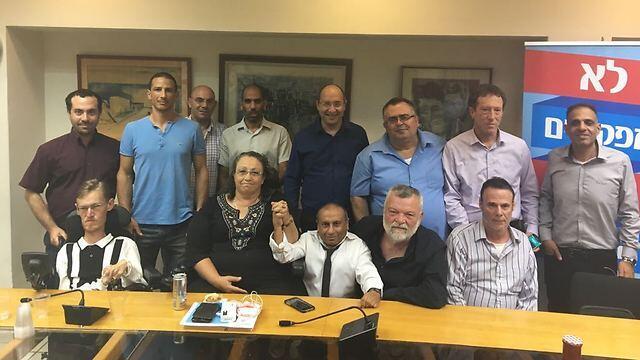Getting your Trinity Audio player ready...
Despite an agreement reached between representatives from the government and the leaders of the disabled protest ,with aid from the Histadrut Labor Federation, roads in Israel were blocked again Sunday morning by the Disabled Panthers—the only group of protesters that didn't take part in the negotiations.
The group blocked the southbound lanes of the coastal road (Highway 2) at HaSira Interchange in Herzliya, where clashes erupted last week between the protesters and the police. Later in the day, protesters also blocked the southbound Ayalon Highway (Highway 20) between the Glilot and KKL interchanges.
Disabled Panthers announced it was not accepting the agreement and would continue to block major highways across the country.
4 View gallery


Disabled Panthers blocking HaSira Interchange in Herzliya, Sunday morning (Photo: Amir Alon)
(צילום: אמיר אלון)
"We continue as usual, the agreement signed in the middle of the night is a betrayal of the disabled, signed at 2am without informing everyone," the organization's leader Eyal Cohen said Sunday morning.
"Not only we are opposed (to the agreement), there are at least ten disabled organizations that do not accept (it)," he added. "They believed in the people who represented the disabled. Now they understand they were betrayed, that their representatives made a rushed decision at 2am before Yom Kippur.
"Whoever agreed on the behalf of the disabled is a liar and a traitor. They sold us out for cheap, saying they would not agree to anything unless it included a clause to equate the benefits to the at least the minimum wage. We are starting a war, ready for any scenario, ready to be arrested.
"What will be, will be. In war, as in war, there are casualties on both sides."
4 View gallery


Disabled Panthers leader Eyal Cohen (Photo: Disabled Panthers)
(צילום: ''הנכים הופכים לפנתרים'')
"All the organizations agreed on equating disability benefits to the minimum wage, until a week ago," said Lavi Naor, spokesman for the Disabled Panthers.
"There are huge groups behind us. That's what we promised them from the beginning, and they trusted us," Naor added. "The government has divided and conquered the disabled and left us in poverty. They tired them out until the middle of the night, and after 13 hours of discussions, when the disabled said they could not do it anymore, the agreement was signed."
Before the blockade, Cohen and other demonstrators spoke with police representatives who asked them to block the road for shorter periods of time. They reached an agreement whereby the blockade will only last for half an hour.
4 View gallery


Police representatives negotiate with the disabled protestors (Photo: Amir Alon)
(צילום: אמיר אלון)
Oren Helman, a prominent activist for the Integration of People with Disabilities Into the Workplace and Society, argued that "the most serious missed point is that the barriers people with disabilities face when trying to join the work force and integrate into society have not been removed."
Helman explained people with disabilities will lose their benefits if they work and make more than NIS 4,000.
"This is bad news for tens of thousands of people with severe disabilities who work, and do not receive a meaningful incentive to work and make a living," he said.
4 View gallery


Representatives from the government, Histadrut and disabled organizations reach the landmark agreement (Photo: Histadrut)
(צילום: דוברות ההסתדרות)
"This is an historic agreement that would bring to a significant improvement in the condition of disabled people in Israel," Netanyahu said in a statement released after the end of the Yom Kippur holiday. "There will be a significant increase (in benefits) beginning this coming January and reaching NIS 4.2 billion."
Chairman of the National Economic Council Prof. Avi Simhon, who was the government's representative in the negotiations with the Histadrut and the disabled organizations, will present the agreed outline at the cabinet on Sunday.

